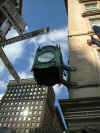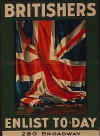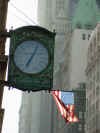 |
New York
Architecture Images-Soho
A.T. Stewart Dry Goods Store/ Sun Building Landmark |
|
architect |
Joseph Trench and John B. Snook |
|
location |
280 Broadway |
|
date |
1846 |
|
style |
Renaissance Revival |
|
construction |
|
|
type |
Shop |
|
|
   |
|
images |
      |
|
|
      |
      |
|
|
notes |
This white
marble structure was built as the first department store in the United
Stated. Based on the form of an Italian palazzo, this may be the first
example of Renaissance Revival architecture in New York. The building's
accurate proportions and restrained geometrical ornamentation generated
associations with Europe that enhanced its commercial and architectural
success. Twelve-foot high ground floor windows showcased the store's
merchandise and allowed light into the interior.
With the mid 19th century growth of the residential area around Washington Square, A.T. Stewart moved his store to Broadway between 9th and 10th Streets. Situated near the city's political and civic center, the old store building was converted into the headquarters of the Sun Newspaper. Today this building houses municipal offices. The Sun Building at 280 Broadway, is located on the east side of Broadway between Chambers and Reade Streets. With the important exception of City Hall, it is the oldest of the City's buildings that DCAS manages. Now a seven-story building, its original five-story section, at Broadway and Reade, was completed in 1846. (This was just ahead of 209 Joralemon Street - then Brooklyn City Hall, and now the Brooklyn Borough Hall - which was under construction from 1845-1848.)
In 1917, the New York Sun Newspaper bought the building, giving it the name by which it is referred to today. The City took title to the
building in 1966 with the intention of demolishing it, as part of the
then-planned Civic Center development. That plan was later set aside. In
1995, the City utilized a unique public/private initiative to begin to
restore the entire building. Since 280 Broadway is the only building in
the DCAS portfolio that contained extensive retail areas on the street
level and second floor, the City worked with a private developer to
completely renovate the interior and to preserve the retail portions.
The renovation was completed in 2002. Retail tenants had already moved
into the first and second floors, and the City's Department of Buildings
now occupies the upper-level floors.
|
|
links |